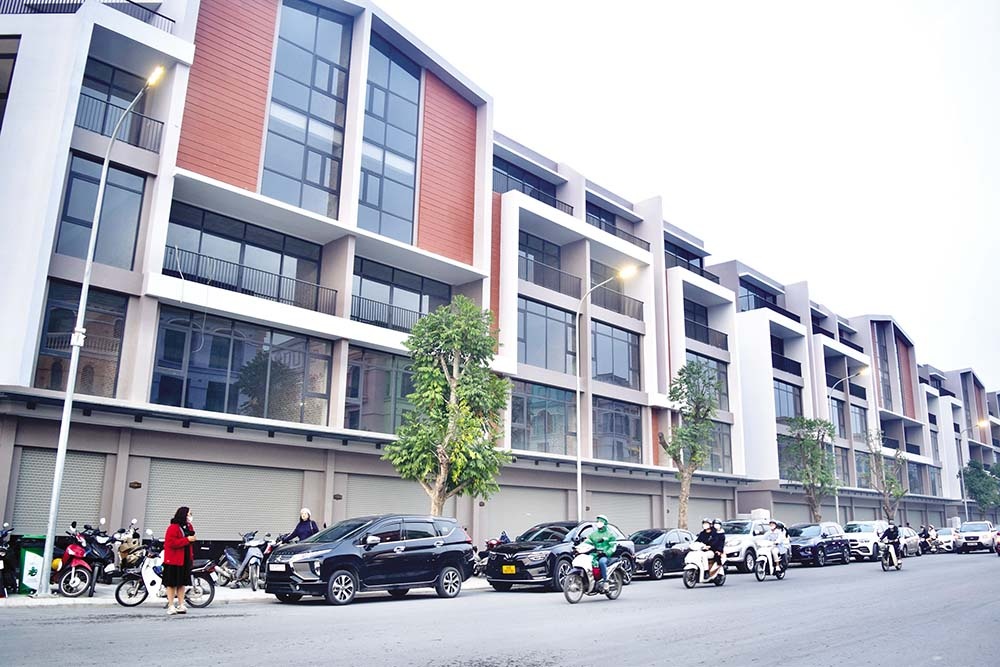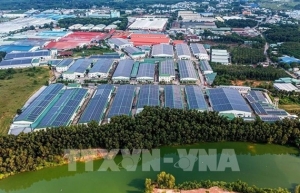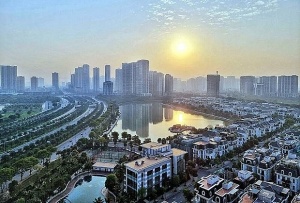Real estate businesses eye less optimistic Q2
In the second quarter (Q2) of this year, Phat Dat Real Estate Development JSC (PDR) posted only $345,800 in net revenue from sales and service supplies, but thanks to increased financial income, the company's post-tax profit during the period amounted to $2.04 million. However, this was still an 81 per cent dip compared to one year ago.
 |
| Despite some rebounds, the realty market is still far from 2019 levels |
Similarly, Century Land Real Estate JSC (CRE) saw a 20 per cent drop in its net revenue on-year, falling to around $13.9 million, and its post-tax profit shed 9 per cent on-year to $358,300.
“There have been some positive signs, but nothing particularly robust. Our real estate investment sank compared to one year ago as several projects are yet to launch, leading to falling revenue and profit,” said a company representative.
The two above firms are examples of the market's less positive business picture. Many other real estate firms have also reported a retreat in Q2, including Khai Hoan Land, Hai Phat Investment JSC, An Duong Thao Dien JSC, Viet Property JSC, LDG Investment JSC, to name but a few.
Vo Hong Thang, investment director of southern real estate service major DKRA Group, said less positive figures in Q2 was inevitable as the property market has been in the doldrums for quite some time.
“The realty market has faced stormy times since early 2022, with flat sales and plunging core business lines. The market started to show signs of a rebound late last year,” said Thang.
The apartment segment is expected to lead the market rebound, but has yet to see a spike in transactions.
Thang cited that in H1 of this year, the apartment segment in Ho Chi Minh City and its surroundings welcomed new supply of about 15,000 units, but only about 3,300 units were sold, up 8 per cent on-year but only equal to 15-20 per cent of pre-pandemic 2019.
Thang expects that companies' revenue growth will resume momentum in core business segments from 2025.
Senior expert Nguyen Tri Hieu, director of the Toan Cau Institute, said the gloomy business picture was no surprise, but there were bright spots on the market's general landscape.
“Registered foreign investment in Vietnam was estimated at $15.2 billion in H1, up 13.1 per cent on-year. Industrial real estate could benefit as foreign investors are more vigorously entering the Vietnamese market,” said Hieu.
Despite these headwinds, several firms have efficiently weathered the storm.
For example, southern industrial park developer Tin Nghia JSC counted $1.7 million in net revenue in Q2, up 7 per cent on-year, and post-tax profit of $2.8 million, equal to a five-fold increase.
The company has attributed the growth to increased services providing income at Tam Phuoc Industrial Park (IP) in Dong Nai province, where wood businesses have secured orders for stable operations.
Another IP developer, Sonadezi Long Thanh JSC, counted $5.2 million in net revenue in Q2, up 16.8 per cent on-year, and its net profit touched $1.4 million, showing a 54 per cent jump on-year.
 | Industrial real estate emerges out of storm The industrial real estate segment has emerged as a driver of the property market after sailing through the economic storm last year thanks to the foreign direct investment (FDI) influx, experts have said. |
 | Real estate 'golden triangle' heats up The 'real-estate fever' in the 'golden triangle' of Ho Chi Minh City-Binh Duong-Dong Nai has been attributed to Ho Chi Minh City's price pressures and the building of key transportation infrastructure developments, with many new projects that connect the southwest economic region with other areas implemented since the start of the year. |
 | Real estate firms back on track The real estate market is showing inspiring signs amid resumed transactions, with businesses in the sector about to embrace a new growth cycle. |
What the stars mean:
★ Poor ★ ★ Promising ★★★ Good ★★★★ Very good ★★★★★ Exceptional
 Tag:
Tag:
Related Contents
Latest News
More News
- Saigon Centre gains LEED platinum and gold certifications (February 12, 2026 | 16:37)
- Construction firms poised for growth on public investment and capital market support (February 11, 2026 | 11:38)
- Mitsubishi acquires Thuan An 1 residential development from PDR (February 09, 2026 | 08:00)
- Frasers Property and GELEX Infrastructure propose new joint venture (February 07, 2026 | 15:00)
- Sun Group led consortium selected as investor for new urban area (February 06, 2026 | 15:20)
- Vietnam breaks into Top 10 countries and regions for LEED outside the US (February 05, 2026 | 17:56)
- Fairmont opens first Vietnam property in Hanoi (February 04, 2026 | 16:09)
- Real estate investment trusts pivotal for long-term success (February 02, 2026 | 11:09)
- Dong Nai experiences shifting expectations and new industrial cycle (January 28, 2026 | 09:00)
- An Phat 5 Industrial Park targets ESG-driven investors in Hai Phong (January 26, 2026 | 08:30)





























 Mobile Version
Mobile Version